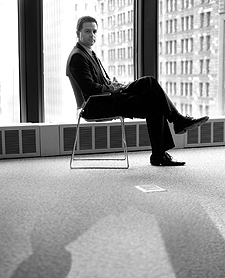Political corruption is nothing new in Illinois, but even the most hardened Chicagoans have tuned in to watch Patrick Collins, an unassuming assistant U.S. attorney, prosecute the once mighty. Quiet and serious, much like his boss, U.S. attorney Patrick Fitzgerald, Collins seems determined, if not dogged, in his pursuit of corrupt officials-most notably, former governor George Ryan and Robert Sorich, the onetime City Hall patronage chief. Married, with a son and two daughters (one born during the closing arguments in the Sorich trial), the 42-year-old attended Benet Academy in Lisle, then went on to Notre Dame and University of Chicago Law. Chicago talked to Collins about his work and his life.
by James Ylisela Jr.
|
Q: You grew up in west suburban Lisle in the 1970s and ’80s. Were you a politically aware kid?
A: As an elementary- and high-school kid, for better or for worse, my focus was almost exclusively basketball [he was team captain]. My dad was a blue-collar guy trying to raise seven kids. My mom was a stay-at-home mom. My dad yelled at the TV about politicians, but I didn’t have a sense of corruption at that point.
Q: Chicagoans can be pretty cynical about corruption. OK, you put that guy away, they say, but it’s never going to stop. What do you say to them?
A: I certainly acknowledge that point of view. I take exception to it. I’m no social scientist, but I think there’s a threshold that’s reached, and I hear a strain of people saying that’s enough. We take real pride in showing the tangible effects of corruption, that there are victims of corruption, and consequences to corruption. I think people get that.
Q: This is deeply entrenched stuff in Chicago. What is politics and what is a crime? Is there a fine line?
A: That came up in both trials. The primary defense was that politics and government is just a blend, and you can’t pull the two apart. When George Ryan was making governmental decisions based on a private or personal gain to himself, his family, or friends, that was over the line. In the Sorich trial, you had the rigging of [employment] exams to essentially subsidize an electoral army. That was over the line.
Q: Let’s review all the ways you’ve been described: “Quiet and unassuming.” “Fiery.” “Dripping with sarcasm.” “Serious as a heart attack.” Do those fit?
A: I’m a serious person, but I’d like to think I don’t take myself too seriously. My siblings and my kids think I can be goofy and funny, but no one would ever say that in this office. I’m a pretty good dancer at a wedding, even when I haven’t had a couple of cocktails.
Q: You once said you follow the evidence to get from the drug couriers to the drug kingpins. Can we expect any more kingpins?
A: If someone would have told me when the [Ryan] investigation started or even a couple of years into it that we would have been talking about the conviction of the governor, I would have said there’s absolutely no way. In corruption cases you really don’t know how much is concerted activity, how much of it is people off on frolics and detours. It depends on where the evidence leads you. We go until the trail goes cold.
Q: Is it presumptuous to assume the trail has not gone cold? You’ve said that some of the crimes you’ve prosecuted were “condoned and facilitated” by high-ranking officials in city hall.
A: I will only say we have a very active and ongoing investigation. But [convicted former water department boss] Don Tomczak testified at the Sorich trial that he was building the [political] army and getting rewarded to build the army, and that was all celebrated [at city hall]. You cannot do that in an operation that has zero tolerance for [corruption].
Q: Any advice for potentially corrupt government officials?
A: “Fast-forward to your sentencing day.” I’m not one of these Pollyannaish people, but it would seem at some point that the potential negative repercussions far outweigh whatever benefits there are. All I can say is that we’ll be out there, and we’ll be looking.



